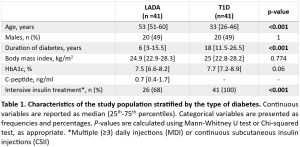Background and aims: Latent autoimmune diabetes in adults (LADA) is marked by a slower decline in β-cell reservoir over time than type 1 diabetes (T1D). Immunological factors related to the different natural history of LADA and T1D may unveil novel protective pathways for target therapies. IFN-α prompts the deadly autoimmune attack towards β-cells during the early stages of T1D pathogenesis. We hypothesized that autoantibodies against IFN-α (AAb-IFN-α) might neutralize the harmful effect of IFN-α towards β-cells and, therefore, might be associated with the less aggressive β-cells decline observed in LADA. In this study, we aimed to investigate the presence of multiple positivity to AAb-IFN-α in people with LADA compared to T1D. Materials and methods: In this cross-sectional study, we enrolled 41 subjects with LADA and 41 subjects with T1D matched 1:1 for sex and BMI. The AAb-IFN-α levels were tested with a cell-based approach using the HEK-BlueTM IFN-α/β reporter cells, which expresses alkaline phosphatase (AP) after stimulation with different isoforms of IFN-α (1, 2 and 14). Clinical features of the study participants were retrieved from medical records. Results: Main clinical features of people with LADA and T1D are summarized in Table 1. No subject with T1D and seven (17%) participants with LADA showed positivity to ≥2 AAb-IFN-α (p=0.006). In addition, the number of subjects with AAb against each IFN-α isoform was higher amongst LADA than amongst T1D. People with LADA testing positive for ≥2 AAb-IFN-α showed lower fasting blood glucose levels than people with LADA negative or positive to only one AAb-IFN-α (p=0.045). Among LADA positives, the levels of AAb against IFN-α2 isoform inversely correlates to GADA titer (rho=-0.513; p=0.025). Conclusions: Individuals with LADA seem to be more prone to develop autoimmunity against IFN-α than individuals with T1D. Longitudinal studies are needed to evaluate whether and at what extent the presence of AAb-IFN-α might slow down β-cell loss in autoimmune diabetes. Funding. Italian Ministry of University and Research, PRIN #2017KAM2R5; Sapienza University of Rome, Starting Grants 2023 #AR123188B46C5984.


